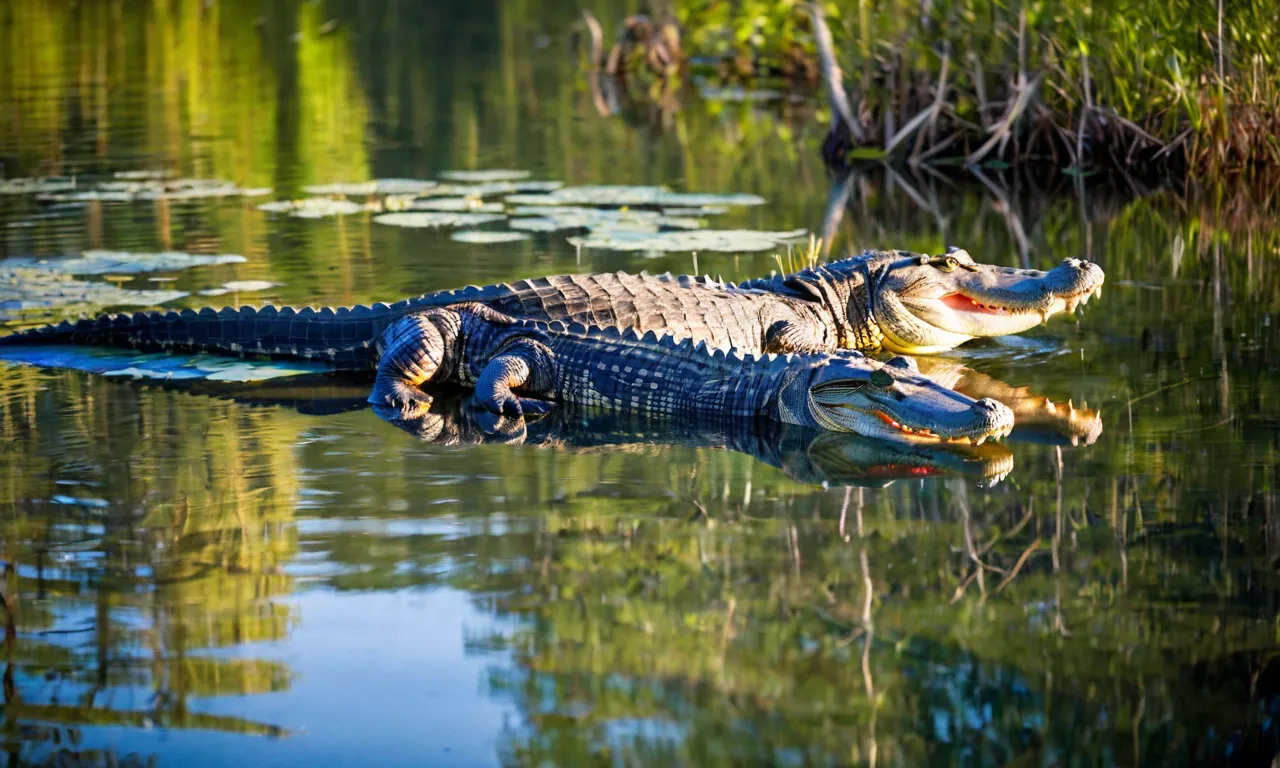Alligators In Lake Placid, Florida: What You Need To Know
Lake Placid, located in Highlands County in central Florida, is a popular spot for fishing, boating, and wildlife viewing. However, the lake and its surroundings are also home to a large population of American alligators.
If you’re planning a trip to Lake Placid and wondering about the alligators, this comprehensive guide will tell you everything you need to know.
If you’re short on time, here’s the key things to know about alligators in Lake Placid: Alligators live in and around the lake year-round. While attacks are rare, it’s vital to be aware of your surroundings, give the alligators space, and never feed them.
During mating season from April to June alligators are more active and territorial.
In this nearly 3000 word guide, we will cover topics like the history of alligators in Lake Placid, where they can be found around the lake, alligator behavior and biology, safety tips for avoiding negative encounters, rules and regulations for interacting with them, and more.
Read on to learn everything about these prehistoric creatures in modern day Lake Placid.
Background and History of Alligators in Lake Placid
Lake Placid, Florida is home to a diverse range of wildlife, including the iconic American alligator. Understanding the background and history of alligators in this area can provide valuable insights into their presence and conservation efforts.
Native Species in Florida
Florida is known for its unique and diverse ecosystem, and alligators have been a part of this ecosystem for millions of years. They are considered a native species to the state and have played a vital role in maintaining the ecological balance.
Alligators are apex predators, meaning they are at the top of the food chain, and their presence helps regulate populations of other species.
Florida’s wetlands, including Lake Placid, provide the ideal habitat for alligators. These wetlands offer a combination of freshwater, vegetation, and abundant prey, making them the perfect environment for these reptiles to thrive.
Arrival of Alligators in Lake Placid
The arrival of alligators in Lake Placid can be attributed to their natural dispersal abilities. Alligators are known to travel long distances in search of new territories, especially during the breeding season.
As a result, they may have migrated from nearby bodies of water, such as the Everglades or Lake Okeechobee, to settle in Lake Placid.
It is important to note that the presence of alligators in Lake Placid is not a recent phenomenon. These reptiles have inhabited the area for many years, coexisting with the local community and other wildlife.
Current Population and Conservation
The exact population of alligators in Lake Placid is difficult to determine, as they are not actively monitored on an individual basis. However, the Florida Fish and Wildlife Conservation Commission (FWC) estimates that there are approximately 1.3 million alligators in the state.
The FWC plays a crucial role in the conservation and management of alligators. They closely monitor alligator populations, enforce regulations to protect both humans and alligators, and provide education to the public about coexisting with these reptiles.
If you encounter an alligator in Lake Placid or any other area, it is important to remember that they are wild animals and should be treated with caution. Keeping a safe distance and avoiding any interaction is the best practice for both your safety and the well-being of the alligators.
For more information about alligators in Florida, you can visit the official website of the Florida Fish and Wildlife Conservation Commission at https://myfwc.com/wildlifehabitats/wildlife/alligator/.
Alligator Habitats and Behavior Around Lake Placid
When it comes to alligators in Lake Placid, Florida, understanding their habitats and behavior is crucial for both residents and visitors alike. These magnificent creatures have adapted to thrive in the diverse ecosystems surrounding the lake, showcasing fascinating habits and behaviors that make them truly unique.
Favorite Lake Habitats
Alligators in Lake Placid have a variety of habitats they favor. They can be found in freshwater marshes, swamps, and even lakeshores. These bodies of water provide abundant food sources and ideal conditions for alligator nesting and basking.
It’s important to note that alligators are cold-blooded creatures, which means they rely on the external environment to regulate their body temperature. This is why they can often be seen sunning themselves on the banks of the lake.
Basking and Nesting Areas
One of the key behaviors of alligators in Lake Placid is their affinity for basking. Basking is when alligators rest and warm themselves in the sun, which helps regulate their body temperature. You can often spot them lying motionless on the shores or floating near the surface of the water.
These basking areas are important for their overall well-being and are also used for nesting purposes. Female alligators construct nests made of vegetation, sticks, and mud to lay their eggs in. These nests are carefully chosen in areas that provide protection and warmth for the eggs to develop.
Hunting and Feeding Patterns
Alligators are formidable hunters and play a crucial role in maintaining the balance of the ecosystem around Lake Placid. They primarily feed on fish, turtles, birds, and small mammals. Their hunting patterns are opportunistic, often lying in wait for their prey to come within striking distance.
Alligators have a stealthy approach, using their powerful tails to propel themselves through the water and ambush their unsuspecting prey. Their jaws are equipped with numerous sharp teeth, allowing them to capture and devour their meals with ease.
Mating Season Activities
Alligator mating season in Lake Placid typically occurs from April to June. During this time, male alligators engage in impressive displays of dominance to attract mates. They emit deep bellows and perform water slaps, creating a loud noise that can be heard across the lake.
These displays not only serve to establish dominance but also attract female alligators. Once a pair has formed, they engage in courtship rituals that involve head rubbing, snout lifting, and various vocalizations.
This leads to successful mating and ultimately the continuation of the alligator population in the area.
Understanding the habitats and behaviors of alligators in Lake Placid is essential for fostering coexistence and ensuring the safety of both humans and these incredible reptiles. If you are interested in learning more about alligators or want to observe them in their natural habitat, be sure to visit the Florida Fish and Wildlife Conservation Commission website for further information and guidelines.
Staying Safe: Tips For Avoiding Alligator Confrontations
Give Space and Never Provoke
When encountering an alligator in Lake Placid, Florida, it is crucial to remember to give them space and never provoke them. Alligators are typically not aggressive towards humans unless they feel threatened or provoked.
It’s important to maintain a safe distance and never approach, feed, or attempt to touch these creatures. Remember, they are wild animals and should be treated with respect and caution.
Be Extra Vigilant With Pets and Small Children
If you have pets or small children with you, it’s essential to be extra vigilant when near alligator habitats. Alligators may see small animals or children as potential prey, especially if they are near the water’s edge. Keep your pets on a leash and within your sight at all times.
Never allow them to wander close to the shoreline or swim in areas where alligators are known to inhabit. Additionally, closely supervise children and ensure they understand the importance of staying away from alligators.
Avoid Shorelines at Dawn and Dusk
Alligators are most active during dawn and dusk, making it vital to avoid shorelines during these times. These are the periods when alligators are more likely to be hunting or feeding. By staying away from the water’s edge during these hours, you significantly reduce the risk of encountering an alligator.
Instead, opt for activities away from the shoreline or choose other times of the day to enjoy the outdoors.
No Swimming or Night Fishing Allowed
In Lake Placid, Florida, it is important to note that swimming and night fishing are not allowed in areas known to have alligators. This restriction is in place to ensure the safety of both humans and the alligators themselves.
Swimming in alligator habitats increases the chances of encountering these creatures, and night fishing can attract alligators due to the presence of food. Always follow the rules and regulations set by the local authorities to prevent any potential confrontations with alligators.
For more information on alligator safety and guidelines, you can visit the official website of the Florida Fish and Wildlife Conservation Commission at https://myfwc.com/wildlifehabitats/wildlife/alligator/
Laws and Regulations Regarding Lake Placid Alligators
No Feeding, Harassing, or Killing Gators
When it comes to alligators in Lake Placid, Florida, it is important to know and abide by the laws and regulations in place to ensure the safety of both humans and these reptiles. One key regulation is the prohibition of feeding, harassing, or killing alligators.
This rule is in place to prevent any negative interactions between humans and alligators, as well as to preserve the natural behavior and habitat of these animals. Feeding alligators can cause them to associate humans with food, leading to potentially dangerous situations.
Harassing or killing alligators is not only cruel but also illegal, with penalties ranging from fines to imprisonment.
Fishing Pole Requirement When Shore Fishing
For those who enjoy fishing in Lake Placid, it is important to be aware of the fishing regulations specific to alligators. When shore fishing in areas where alligators are present, it is required to use a fishing pole.
This requirement helps ensure that alligators are not accidentally hooked or injured during the fishing process. By using a fishing pole, anglers can maintain a safe distance from the alligators and avoid any potential conflicts or harm to the animals.
It is always advised to familiarize yourself with the specific fishing regulations in Lake Placid, as they may be subject to change.
Leash Law For Pets Near Waterways
Lake Placid has implemented a leash law for pets near waterways, including areas where alligators may reside. This law is in place to protect both pets and alligators from potential harm. By keeping pets on a leash, owners can prevent them from wandering too close to the water where alligators may be present.
This regulation not only ensures the safety of pets but also helps maintain the natural behavior and habitat of alligators. It is crucial for pet owners to follow this law to avoid any dangerous encounters and to respect the wildlife in the area.
Penalties For Violating Rules
Violating the laws and regulations regarding alligators in Lake Placid can result in penalties. The specific penalties may vary depending on the severity of the violation and can include fines, community service, or even imprisonment.
It is essential to understand and abide by these rules to ensure the safety of both humans and alligators. To stay updated on the current regulations and penalties, it is recommended to visit the official website of the Florida Fish and Wildlife Conservation Commission (https://myfwc.com/), which provides detailed information on alligator-related laws and regulations in the state.
What To Do In An Alligator Encounter or Attack
Encountering an alligator can be a frightening experience, especially if it feels threatened or becomes aggressive. Knowing how to respond in such situations is crucial for your safety. Here are some essential tips to keep in mind when encountering or being attacked by an alligator:
Stand Your Ground if Charged
If you find yourself in the unfortunate situation of being charged by an alligator, it’s important to stay calm and stand your ground. Running away can trigger the alligator’s instinct to chase and attack. Instead, slowly back away from the alligator while keeping a close eye on its movements.
Make sure to maintain a safe distance and never turn your back on the alligator.
Fight Back if Attacked
In the rare event that an alligator attacks you, it is crucial to fight back with all your strength. Aim for the sensitive areas such as the eyes and snout, as these are the most vulnerable parts of an alligator’s body.
Use any available objects or tools to defend yourself, such as sticks, rocks, or even your own fists. Remember, the goal is to deter the alligator from further aggression and protect yourself from harm.
Seek Medical Attention For Any Bite or Injury
After an encounter or attack with an alligator, it is essential to seek immediate medical attention, regardless of the severity of your injuries. Alligator bites can lead to serious infections and other complications, so it’s crucial to have a healthcare professional evaluate and treat your injuries properly.
Even if the bite seems minor, it’s better to be safe than sorry when dealing with potential infections.
For more information on alligator encounters and safety tips, you can visit the Florida Fish and Wildlife Conservation Commission website. Remember, staying educated and prepared can greatly reduce the risks associated with alligator encounters.
Conclusion
In conclusion, while Lake Placid’s alligator population demands healthy respect and caution, there’s no need to avoid the area if you follow proper safety measures. By being aware of your surroundings, keeping space between yourself and alligators, and never tempting them with food, attacks should remain very rare occurrences.
While they may look intimidating and prehistoric, alligators are an important part of Lake Placid’s ecosystem that will generally ignore humans if left alone.








